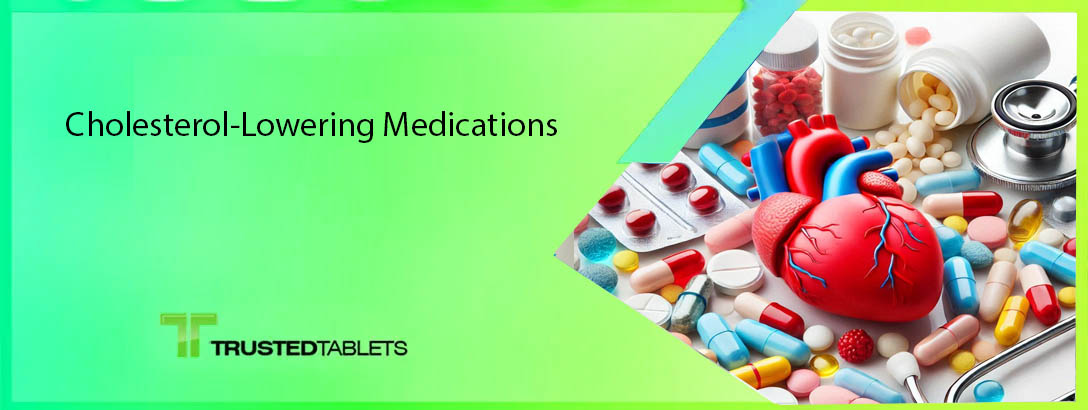Understanding Cholesterol and Why It Matters
Cholesterol—yeah, we’ve all heard of it. It’s that waxy, fat-like substance in your blood that your body actually needs to function properly. It helps build cells, produce hormones, and even make vitamin D. Sounds good, right? Well, not always. When cholesterol levels go haywire, they can lead to some serious health risks like heart disease, strokes, and clogged arteries.
There are two key players in this cholesterol game:
- LDL (Low-Density Lipoprotein) – The “bad” cholesterol. Too much of it can clog up your arteries, leading to major health problems.
- HDL (High-Density Lipoprotein) – The “good” cholesterol. This one helps clear out LDL from your bloodstream, keeping things in check.
While lifestyle changes like diet and exercise are essential, sometimes they just aren’t enough. That’s where cholesterol-lowering medications come in. Let’s break them down!
Types of Cholesterol-Lowering Medications
1. Statins: The Heavy Hitters
Statins are the go-to prescription for lowering LDL cholesterol. They work by blocking an enzyme called HMG-CoA reductase, which your liver uses to make cholesterol.
Popular statins:
- Atorvastatin (Lipitor)
- Rosuvastatin (Crestor)
- Simvastatin (Zocor)
- Pravastatin (Pravachol)
Why people take them:
- Can slash LDL cholesterol by 30-50%
- Boosts HDL (good cholesterol)
- Reduces inflammation in blood vessels
Potential side effects:
- Muscle pain or weakness
- Rare cases of liver damage
- Slightly higher risk of type 2 diabetes
2. Ezetimibe: The Cholesterol Blocker
Ezetimibe (Zetia) takes a different approach—it stops your body from absorbing cholesterol from food. It’s often paired with statins for better results.
The perks:
- Lowers LDL by 15-20%
- Works well with statins for extra cholesterol control
Possible downsides:
- Stomach pain
- Diarrhea
- Rare muscle weakness
3. PCSK9 Inhibitors: The New-Age Solution
PCSK9 inhibitors are the new kids on the block. They work by blocking a protein (PCSK9) that prevents your liver from clearing LDL cholesterol.
Popular options:
- Alirocumab (Praluent)
- Evolocumab (Repatha)
Why they’re awesome:
- Can cut LDL levels by 50-60%
- Great for people with genetic high cholesterol (familial hypercholesterolemia)
- A good alternative if statins aren’t enough
Drawbacks:
- Flu-like symptoms
- Injection site reactions (since they’re given as shots)
- Slightly higher risk of infections
4. Bile Acid Sequestrants: The Binders
These drugs bind to bile acids in your gut, forcing your liver to use up more cholesterol to make new bile acids. That lowers your LDL cholesterol levels.
Common ones:
- Cholestyramine (Questran)
- Colesevelam (Welchol)
- Colestipol (Colestid)
Why they’re useful:
- Reduce LDL by 10-20%
- Can be used when statins aren’t tolerated
Possible side effects:
- Constipation (big time!)
- Bloating
- Can mess with vitamin and medication absorption
5. Fibrates: The Triglyceride Tacklers
Fibrates aren’t as focused on LDL—they mainly lower triglycerides (another type of fat in your blood) and slightly boost HDL.
Common fibrates:
- Fenofibrate (Tricor, Lipofen)
- Gemfibrozil (Lopid)
What they do:
- Slash triglycerides by 25-50%
- Modestly increase HDL
Risks:
- Gallstones
- Rare liver toxicity
- Increased muscle pain risk when used with statins
6. Niacin (Vitamin B3): The HDL Booster
Niacin (also known as vitamin B3) is all about raising HDL while lowering LDL and triglycerides. It’s available both as a prescription (Niaspan) and over the counter.
Why people use it:
- Increases HDL by 15-35%
- Lowers triglycerides
The downsides:
- Flushing (that warm, red skin feeling)
- Liver toxicity at high doses
- Can raise blood sugar levels
7. Omega-3 Fatty Acids: The Natural Option
Prescription-strength omega-3 fatty acids (from fish oil) are excellent for lowering triglycerides.
Top choices:
- Icosapent ethyl (Vascepa)
- Omega-3 ethyl esters (Lovaza)
The benefits:
- Can cut triglycerides by 20-50%
- Reduce inflammation
- Support heart health
Possible drawbacks:
- Fishy aftertaste (ugh!)
- Slightly increased bleeding risk
How to Pick the Right Medication
Choosing the best cholesterol-lowering drug isn’t a one-size-fits-all situation. Your doctor will consider:
- Your cholesterol levels (LDL, HDL, triglycerides)
- Any existing health conditions (like diabetes or liver disease)
- How well you tolerate certain medications
- Possible drug interactions
A simple blood test (lipid panel) will help determine the best treatment for you.
Lifestyle Changes That Boost Medication Effectiveness
No medication can work magic on its own—you’ve got to do your part too! Here’s how you can make your meds work better:
- Eat heart-healthy foods – Load up on fiber, cut back on saturated fats.
- Get moving – Aim for at least 30 minutes of exercise a day.
- Maintain a healthy weight – Even a small weight loss can make a difference.
- Quit smoking – Smoking lowers HDL and increases heart disease risk.
- Limit alcohol – Too much booze can raise cholesterol and triglycerides.
Final Thoughts
Managing cholesterol isn’t just about popping pills—it’s about a combination of the right medication, healthy lifestyle choices, and regular checkups. Whether you need statins, PCSK9 inhibitors, or natural alternatives like omega-3s, there’s an option out there for you. The key? Work closely with your doctor to find the best treatment plan that fits your needs. Stay proactive, stay healthy, and take control of your cholesterol!


